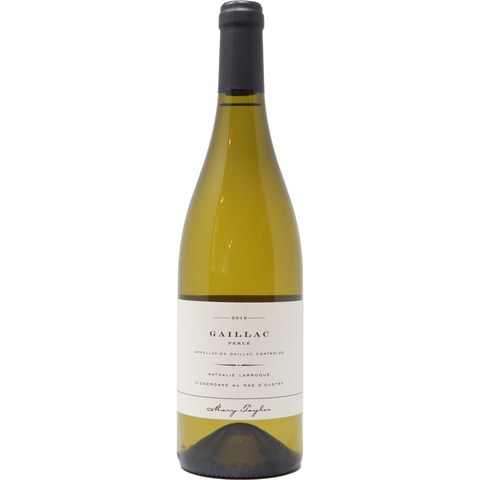
2022 Mary Taylor Gaillac Perlé, Southwest, France
The word “Perlé” indicates a slight bite – tiny bubbles in the wine. Drink as an aperitif – beautiful before dinner to open your senses. The wine is slightly rich and honeyed while simultaneously floral, mineral and racy.
ABOUT THIS WINE
Biodynamic – HVE certified – low sulfur – wild ambient yeast. Vines are pruned in the simple guyot method with grass growing in every other row. They lay an organic fertilizer in early autumn. Half the soil is sodded, between the rows to avoid erosion problems and to provide a greater rural expression. Vine management : de-budding, leaf thinning.
Pheromone trapping of adults beetles (Eudemis) is used primarily during endemic or low periods in an insect’s population cycle.”
The soil is clay and limestone and most of our wines face south-southeast in the case of the reds and north-northeast for the whites. 5000 vine-plant/HA. Skin maceration 12 hours at 10°C, Slow fermentation at 18°. At the end, the wine is chilled below 10° to keep its carbon dioxide. That is how it becomes “perlé”….The blend is made at the end of fermentation. The bottling is done at the autumn period until the end of March. Aged on lees for 2 months then racked.
ABOUT THIS PRODUCER
When Mary first fell in love with wine in the early 1990’s, it was the European classics that truly spoke to her and stole her heart. As a young professional selling French and Italian wine, first in the New York wine auctions and then as a merchant, she quickly learned to appreciate wine in the “Old World” way— not as a luxury good reserved for special occasions, but a living agricultural product that belongs to everyday life.
This awakening eventually led her to move to the storied region of Burgundy. There, deep in the heart of rural French wine country, her experiences living and drinking among the area’s independent artisan growers cemented her understanding of wine as a form of liquid culture, reflecting the people and places where it has been lovingly crafted for generations.
A specific French term exists for this romantic notion that, in addition to tasting delicious, wine should tell us something about the area from which it came. Although impossible to translate literally, this concept of “terroir” has sometimes been described as a “sense of place,” or “somewhere-ness.” It explains why the Pinot Noir from one village in Burgundy will taste noticeably different from the same grape grown in the next town, or even the next vineyard over.
It’s also the reason why most European wine regions label their wines not according to the grape variety, but the “place name,” or “appellation” where it was grown. Whether known in French as appellation d’origine protégée, in Spanish as denominación de origen, or in Italian as denominazione di origine controllata, the basic idea is the same: each designated area imparts its own special identity, no two expressions alike.
After many years working with the wines of Europe, Mary arrived at an important insight. Left in the dark by decades of simplistic marketing efforts that placed grape above geography, American consumers needed a brand they could trust to decipher the complex notion of terroir in a clear and straightforward way. Out of this realization, our elegant “White Label” was born.
Today, it is our mission to unlock the world of European “appellation” wines by working with individual growers in multiple villages— from Bordeaux to Nîmes to Valençay— who produce exceptional, regionally-distinctive wines at extremely accessible prices.
In the traditional spirit of the “Old World,” each Mary Taylor Wine has been selected as a faithful ambassador of its geographical origin, true to local traditions and the vision of the individual farmer who bottled it. We are proud to offer affordable wines of genuine quality and integrity (no shortcuts) that will bring the magic of their “terroirs” to life wherever you choose to enjoy them: at a dinner party, next to the grill, or even just on a quiet night at home.
Details:
| Grape(s) | Mauzac, Muscadelle |
| Farming | Biodynamic |
